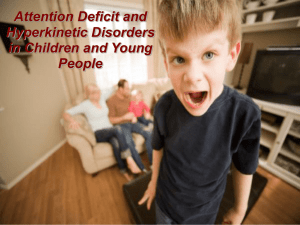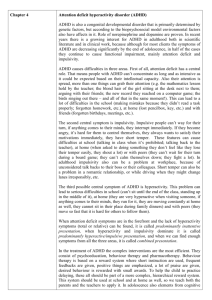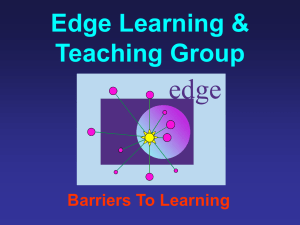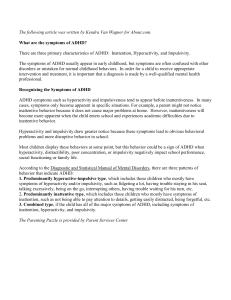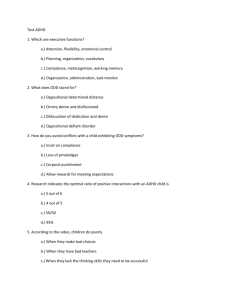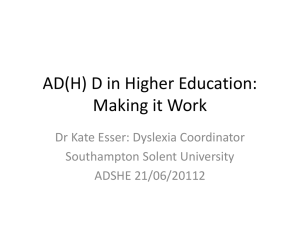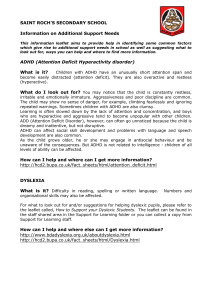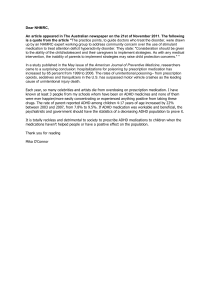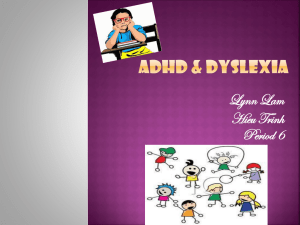ADHD and other specific learning difficulties
advertisement
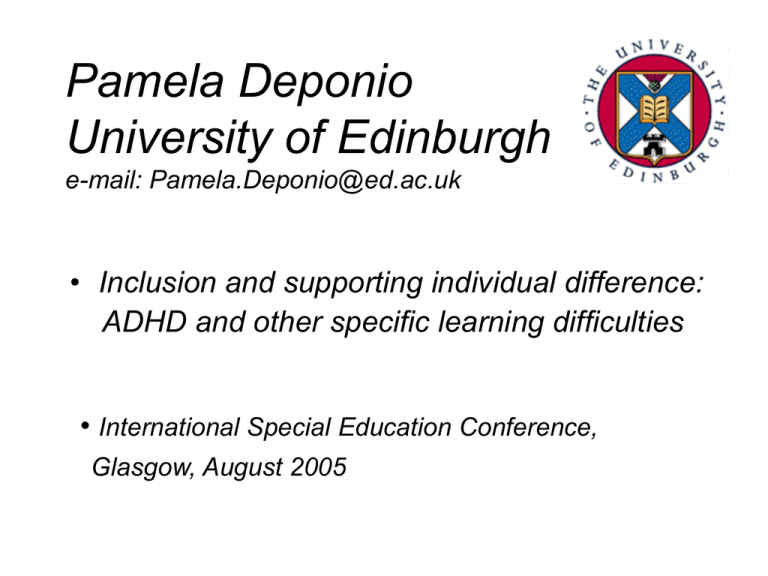
Pamela Deponio University of Edinburgh e-mail: Pamela.Deponio@ed.ac.uk • Inclusion and supporting individual difference: ADHD and other specific learning difficulties • International Special Education Conference, Glasgow, August 2005 Specific Learning Difficulties: definition • Specific Learning Difficulties is an umbrella term which indicates that children display discrepancies across their learning, exhibiting areas of high competence alongside areas of significant difficulty. Macintyre & Deponio (2003) Dyslexia: definition • Dyslexia is a combination of abilities and difficulties which affect the learning process in one or more of reading, spelling and writing. Accompanying weaknesses may also be seen in speed of processing, short term memory, sequencing, auditory and visual perception, spoken language and motor skills. British Dyslexia Association (2000) Definition: dyspraxia • An impairment or immaturity in the organisation of movement which leads to associated problems with language, perception and thought. The Dyspraxia Foundation (1997) Definition: SLI • The term SLI is applied to children who exhibit a significant deficit in language ability yet display normal hearing, age appropriate scores on tests of non-verbal intelligence and no obvious signs of neurological damage. Leonard (2000) Definition: ADHD • A diagnosis of the American Psychiatric Association (1994) encompassing behavioural symptoms of inattention, impulsiveness and hyperactivity that significantly interfere with affected individuals’ family and peer relationships as well as their educational and occupational functioning (Cooper 2001). Specific neurodevelopmental syndromes (adapted from Keen, 2001) ADHD Indicators • • • • Inattention Hyperactivity Impulsive behaviour Indicators must – have early onset – be persistent – be pervasive ADHD /Dyslexia co-occurrence • Adams & Snowling (2001) - co-occurrence over 50% • Halperin et al (1991): 50% ADD meet diagnostic criteria for 1 or more additional disorder • Willcutt & Pennington (2000): ... RD and ADHD co-occur significantly more frequently than would be expected based on chance... ADHD/Dyslexia co-occurrence • Hynd (2002) - 50% children with dyslexia will also have ADHD. • Cantwell & Baker (1991)- 63% children with learning disorders had ‘co-morbid’ ADD. • Gilger et al (1992) - co-occurrence in one fifth cases. ADHD/ Dyslexia Inattention Hyperactivity 4:1 Ratio? Chromosome 6? Gifted / creative Genetic Difficulty with: • consistency Impulsive behaviour • organisation •memory difficulties in •decoding •spelling ADHD/SLI • 50% - 70% young children with hyperactivity & impulsive behaviour experience problems in understanding & expressing ideas ( Sam Goldstein) • Children with developmental speech and/or language disorders have elevated rates of ADHD ( Dennis Cantwell) ADHD / SLI Inattention Hyperactivity Impulsive behaviour Memory Difficulty following instructions Planning & organising Language comprehension Sentence formulation ADHD/Dyspraxia • 50% children with ADHD have Developmental Coordination Difficulties (Gilberg 2003) • DAMP Deficits in Attention Motor Control and Perception (Gilberg 1995) ADHD/Dyspraxia Inattention Hyperactivity Impulsive behaviour Memory Difficulty following instructions Muscle tone Body awareness Planning & organising Sensory integration Motor planning Children difficult to classify • 75% of schools in one Scottish survey claimed they had children they considered to have specific learning difficulties but who they found difficult to classify (Deponio, 2004). Issues in identification of ADHD • Despite the wealth of literature addressing the co-occurrence of specific learning difficulties there is little evidence of holistic assessment in schools. • Children assessed as having ADHD may be receiving an incomplete assessment if there is co-occurrence with another difficulty. Issues in identification of ADHD • Are we aware of the high probability of cooccurrence of specific difficulties? • Who is assessing for co-occurrence ? • How can assessment be holistic? • Can we adopt a collaborative approach to identification? • How can we offer an inclusive learning experience if we don’t identify holistically and support appropriately?
